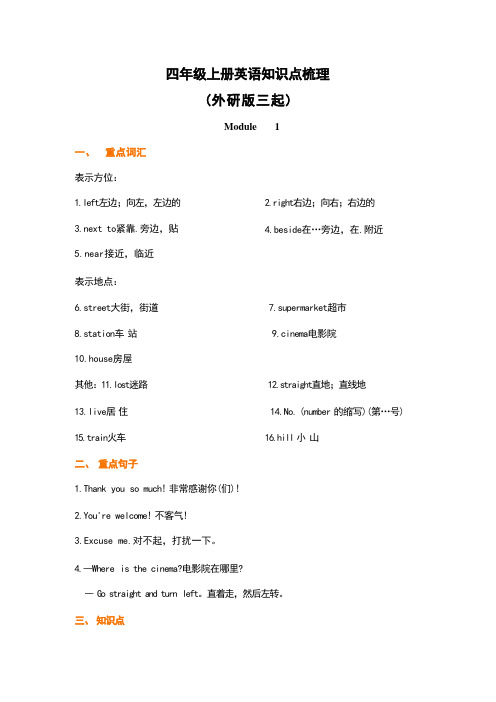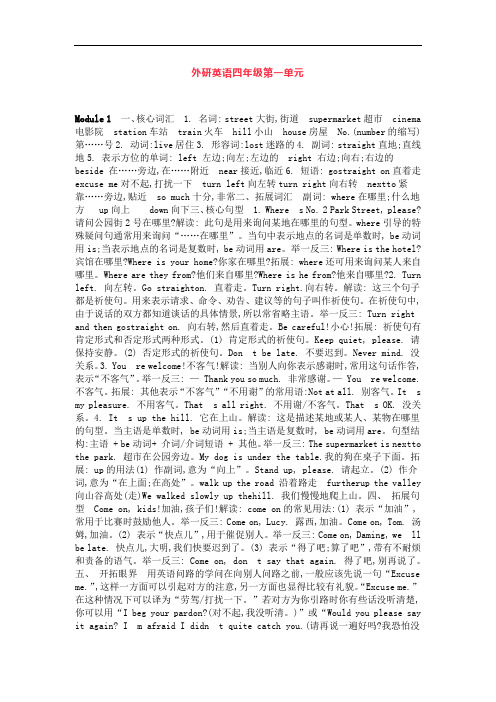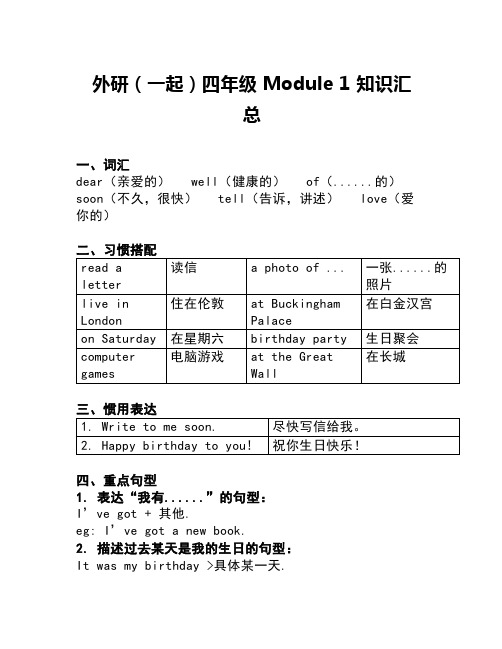外研版英语四年级上册知识汇总
外研版四年级英语上册复习知识点归纳总结

外研版四年级英语上册复习知识点归纳总结外研版四年级英语上册是学生在学习英语过程中的重要阶段,该册内容涵盖了英语的基础知识和技能,包括词汇、语法、听力、口语和阅读等。
本文将对该册中的复习知识点进行归纳总结,以帮助学生更好地复习和掌握所学内容。
一、词汇部分1. 单词记忆在本册中,学生需要掌握一些基础的英文单词,如颜色、数字、食物、动物等。
为了更好地记忆这些单词,学生可以通过与图片的配对、单词拼写、造句等方式进行记忆。
2. 词组搭配除了单词的记忆,学生还需要学会一些常用的词组搭配,如"howare you"、"thank you"、"in the morning"等。
通过反复使用这些词组,可以加深记忆,提高语言表达的流利度。
二、语法部分1. 人称代词学生需要学习使用人称代词,包括主格代词(I、you、he、she、it、we、they)和宾格代词(me、you、him、her、it、us、them)。
在句子中正确使用人称代词,能够更准确地表达自己的意思。
2. 句型转换学生需要学会进行句型转换,如将陈述句变为疑问句、将肯定句变为否定句等。
通过练习句型转换,能够加深对句子结构的理解,提高语言运用的灵活性。
三、听力部分1. 听力理解学生需要通过听力练习来提高对英语的听力理解能力。
在听力练习中,要注意听清楚句子中的关键词,理解句子的意思,并能够作出正确的回答。
2. 句子朗读孩子可以通过听力材料中的句子朗读来提高口语表达能力。
在朗读时,要注意语音语调的准确,以及情感的表达,使语言更加地自然和流利。
四、口语部分1. 对话练习学生需要进行一些对话练习,将所学的知识运用到实际交流中。
可以通过与同学、老师或家长进行对话,模仿对话中的语音语调和表情动作,以及练习常用的问候语和交际用语。
2. 自由口语学生还可以通过自由口语来提高口语表达能力。
可以选择一些自己感兴趣的话题进行口语练习,如家庭、朋友、爱好等。
新外研版(三起)英语四年级上册全册知识点归纳

四年级上册英语知识点梳理(外研版三起)Module1一、重点词汇表示方位:1.left左边;向左,左边的2.right右边;向右;右边的3.next to紧靠.旁边,贴4.beside在…旁边,在.附近5.near接近,临近表示地点:6.street大街,街道7.supermarket超市8.station车站 9.cinema电影院10.house房屋其他:11.lost迷路 12.straight直地;直线地13.live居住14.No. (number 的缩写)(第…号)15.train火车 16.hill 小山二、重点句子1.Thank you so much! 非常感谢你(们)!2.You're welcome! 不客气!3.Excuse me.对不起,打扰一下。
4.--Where is the cinema?电影院在哪里?-- Go straight and turn left。
直着走,然后左转。
三、知识点习惯搭配live at住在No.2Park Street公园街2号go straight on直着走at the station在车站turn left / right向左/右转beside the cinema在电影院旁边all day/ night整日/夜so much十分,非常句子结构询问某人/物的位置-- Where is …?--I t's+其他eg:1.-- Where is the library?-- It's near the park.2.--Where is the cinema?-- Go straight and turn left3.-- Where is my book?-- It's on the desk.Module2一、重点词汇动词:read(读,阅读) take(拍摄)listen( 听) talk(说话,交谈)名词:picture(照片) children(孩子们)(child 的复数形式) China(中国)其他:running(跑步) these(这些)二、重点句子1.Look at these pictures. 看这些照片。
外研版英语四年级上册单元知识点

外研英语四年级第一单元Module 1一、核心词汇 1. 名词: street大街,街道supermarket超市cinema 电影院station车站train火车hill小山house房屋No.(number的缩写)第……号2. 动词:live居住3. 形容词:lost迷路的4. 副词: straight直地;直线地5. 表示方位的单词: left 左边;向左;左边的right 右边;向右;右边的beside 在……旁边,在……附近near接近,临近6. 短语: gostraight on直着走excuse me对不起,打扰一下turn left向左转turn right向右转nextto紧靠……旁边,贴近so much十分,非常二、拓展词汇副词: where在哪里;什么地方 up向上down向下三、核心句型 1. Where s No. 2 Park Street, please? 请问公园街2号在哪里?解读: 此句是用来询问某地在哪里的句型。
where引导的特殊疑问句通常用来询问“……在哪里”。
当句中表示地点的名词是单数时, be动词用is;当表示地点的名词是复数时, be动词用are。
举一反三: Where is the hotel?宾馆在哪里?Where is your home?你家在哪里?拓展: where还可用来询问某人来自哪里。
Where are they from?他们来自哪里?Where is he from?他来自哪里?2. Turn left. 向左转。
Go straighton. 直着走。
Turn right.向右转。
解读: 这三个句子都是祈使句。
用来表示请求、命令、劝告、建议等的句子叫作祈使句。
在祈使句中,由于说话的双方都知道谈话的具体情景,所以常省略主语。
举一反三: Turn right and then gostraight on. 向右转,然后直着走。
Be careful!小心!拓展: 祈使句有肯定形式和否定形式两种形式。
(完整版)外研版四年级英语上册复习知识点归纳总结

四年级英语上册复习知识点归纳总结Module 11.单词straight直地go straight on直着走left 左边lost迷路的live居住No.第……号street大街excuse me对不起,打扰turn left向左转turn right向右转next to... 临近的supermarket超市beside在……旁边cinema电影院so much十分,非常You're welcome!不客气!station车站train火车hill小山near接近,临近house房屋2.短语1)excuse me 打扰一下2)turn left 向左转3)turn right 向右转4)go straight on 直着走5)up the hill 上山6)down the hill 下山7)near the house 在房子附近3.句子(1)A: Excuse me. Where’s No.2 Park Street, please? 打扰了,请问第二公园大街在哪里?B: Go straight on and turn left. 直着走然后向左转。
(2)A: Thank you so much. 十分感谢你。
B: You are welcome. 不用谢。
(3)It’s near the house. 它在房屋附近。
(4)It’s on your left. 它在你的左边。
(5)It’s behind the cinema. 它在电影院后面。
Module 21.单词read阅读running跑步these这些picture图画take拍摄take pictures照相children孩子们listen听listen to听talk说话,交谈talk to和……交谈China中国read—reading take—taking talk—talking play—playing look—looking run—running 2.短语1)read a book 读书2)take pictures 拍照3)watch TV 看电视4)play with a toy train 玩玩具火车5)ride a bike 骑自行车6)fly a kite 放风筝7)listen tomusic 听音乐8)talk tomy friend 和朋友交谈3.句子(1)This is my friend Maomao. 这是我的朋友毛毛。
外研版四年级(上册)英语知识点总结大全

四年级英语复习资料 一、方向:go straight on 直着走 turn left 向左转 turn right 向右转 up ↑向上 down ↓向下二、缩写与完整形式:I ’m=I am, he ’s=heis,she ’s=she is, it ’s=it is you ’re=you are, we ’re=we are, they ’re=they are there ’s=there is, there ’re=there arehave n’t=have not, can ’t=can not, don ’t=do not,isn ’t=is not, aren ’t=are not,三、单复数: I →we, you →you, she/he/it →they man →men people →people picture →pictures friend →friends house →houses vegetable →vegetables thing →things child →children soup →soup potato-potatos tomato-tomatoes milk-milk rice- rice meat-meat this-these that-those 四、现在分词/动名词/ing 形式: (去e 加ing ) write→writing, take→t aking, make→making, ride →riding, (双写加ing ) swim→swimming run →running, get→getting,(直接加ing )play →playinglisten →listening, read →reading, look →looking, row →rowing, drink →drinking want →wanting, cook →cookingjump →jumping, wash →washing, draw →drawing, talk →talking, visit→visiting, count→counting, do→doing, watch →watching turn→turning,五、重点短语句子1、Here ’s a dog. 这有一只小狗. It ’s lost .它迷路了Excuse me .Where ’s No. 2 Park Street ,please?Thank you very mush !十分感谢 You are welcome !不客气 behind the door 在门后面up the hill 上山 down the hill 下山 near the house 房屋附近 at the station 在车站 2、Look at these pictures.看这些图片。
外研版英语四年级上册课本知识点汇总

外研(一起)四年级Module 1 知识汇总一、词汇dear(亲爱的)well(健康的)of(......的)soon(不久,很快)tell(告诉,讲述)love(爱你的)三、惯用表达四、重点句型1. 表达“我有......”的句型:I’ve got + 其他.eg: I’ve got a new book.2. 描述过去某天是我的生日的句型:It was my birthday >具体某一天.eg: It was my birthday on Friday.外研(一起)四年级Module 2 知识汇总一、词汇skirt(短裙)clean(打扫,清理)finish(完成)dirty(脏的)paint(绘画)Mr(先生)phone(打电话)二、习惯搭配三、重点句型表达“过去某人做某事”:主语 + 动词过去式 + 其他.eg: I cleaned my room.Jenny washed her skirt.We went to the park.外研(一起)四年级Module 3 知识汇总一、词汇名词:stay(停留)what(多么)boring(无聊的;令人厌烦的)day(一天;白天)其他:visit(拜访) comic(滑稽的) together (一起)didn’t=did not (不)二、习惯搭配四、重点句型1. 描述“某人过去没有做某事”的句型:主语+ didn’t +事情+ 时间.eg: 1. She didn’t play football yesterday.2. They didn't watch TV last week.外研(一起)四年级Module 4 知识汇总一、词汇1. invent 发明,创造2. paper 纸3. important 重要的4. printing 印刷术5. print 印刷 6. rig ht 正确的,对的7. between 在……之间8. bicycle 自行车9. mouse 老鼠10. man 男人二、习惯搭配1. Chinese people 中国人2. this week 这个星期3. invent paper 发明纸4. invent printing 发明印刷术5. look at 看6. print books and newspapers 印刷书和报纸7. in front of 在……前面8. LastMonday 上星期一9. invent many important things 发明很多重要的东西三、惯用表达1. That’s right. 没错。
外研版英语四年级上册知识点归纳总结(完整版,直接打印)

外研版四年级英语上册知识总结姓名:Module 11.go straight on 直着走2.turn left 向左转turn right 向右转3.excuse me 对不起,打扰一下4.next to 贴近,紧靠...旁边so much 十分,非常5.at the station 在车站up the hill 上山down the hill 下山6.询问某个地方位置的句型:Where + be动词+ 主语?例句:——Excuse me, Where’s the school, please?打扰一下,请问学校在哪里?——Go straight on......7.表示感谢的句型:问句:——Thank you so much! 非常感谢!答语:——You’re welcome. 不客气。
Module 21.take pictures 照相listen to music 听音乐talk to 和......交谈watch TV 看电视read a book 看书write a letter 写信fly a kite 放风筝ride a bike 骑自行车play basketball 打篮球play football 踢足球play with 玩...... look at 看2.介绍某人的句型:This is...... 这是......例句:This is my mother. 这是我的妈妈。
3.现在进行时:表示说话时正在进行或发生的动作。
“正在做......”肯定结构:主语+be(am/ is/ are) + 现在分词+ 其他。
例句:I’m taking picture. 我在照相。
She’s reading a book. 她正在看书。
4.现在进行时的特殊疑问句句型:What + be + 主语+ doing?例句: What are you doing? 你正在做什么?What is he/ she / it doing ? 他/ 她/ 它正在做什么?What are they doing ? 他们正在做什么?Module 3 1.get on the bus 上公共汽车lots of 许多in the park 公园里on the lake 湖面上dragon boat 龙舟play chess 下象棋draw picture 画画soya milk 豆浆2.现在进行时的句型结构:①肯定形式:主语+ be( am/ is/ are)+ doing+ 其他成分。
外研版英语四年级上册1-5模块知识点总结

外研版英语四年级上册1-5模块知识点总结Module 1 问路【重点词汇】1、left左边;向左;左边的2、 right右边;向右;右边的3.live居住 4. street大街,街道5.supermarket超市6. beside在旁边,在……附近7.cinema电影院8.车站station 9.train火车10.hill小山11、near接近,临近12. house房屋13. straight直地;直线地14.No.(number的缩写)第…号【短语归纳】1. go straight on直着走 7、up the hill上山2 excuse me对不起,打扰一下 8. down the hill下山3.next to紧靠…旁边,贴近 9 .behind the door在门后面4. so much十分,非常 10.You' re welcome!不客气5. at the station在车站 11.turn left 向左转6.on one's left/right在…的左边/右边 12. turn right向右转【重点句子】1. Where are you?你在哪里?2 .Where’s No.2 Park Street, please?请问公园街2号在哪里?3. I’m behind the tree.我在树后面。
4. I live at No.2 Park Street.我住在公园街2号5. Excuse me.对不起,打扰一下。
6. It's next to a supermarket它紧挨着超市。
7 .It's beside the cinema.它在电影院旁边。
8.- Thank you so much!非常感谢!You' re welcome!不客气!9.It' s lost.它迷路了。
10. It’s up the hill.它在上山。
- 1、下载文档前请自行甄别文档内容的完整性,平台不提供额外的编辑、内容补充、找答案等附加服务。
- 2、"仅部分预览"的文档,不可在线预览部分如存在完整性等问题,可反馈申请退款(可完整预览的文档不适用该条件!)。
- 3、如文档侵犯您的权益,请联系客服反馈,我们会尽快为您处理(人工客服工作时间:9:00-18:30)。
外研版英语四年级上册知识汇总
M1短语
1.in London在伦敦
2. live in London住在伦敦
3. be from来自
4. very wel1非常好
5. on Saturday在星期六
6. read a letter读一封信
7. a photo of me一张我的照片 8. on my birthday在我生日那天
9. at Buckingham Palace在白金汉宫 10. write to me soon尽快给我回信
11. tell me about China告诉我有关于中国的事情
12. in April在四月 13. watch TV看电视14. my favourite food我最喜爱的食物
15. computer games电脑游戏16. thank you for your letter谢谢你的来信句型:
1.She1ives" in London.
2. It was my birthday on Saturday.
3. We were at Buckingham Palace.
4. I’ ve got a new friend.
M2短语
1. clean my room打扫我的房间
2. wash my trousers洗我的裤子
3. finish my homework完成我的家庭作业
4. help my mum帮助我的妈妈
5. paint a picture画一幅画
6. play the flute吹笛子
7. play with me和我一起玩 8. listen to music听音乐
9. play footbal1踢足球
句型
1.I cleaned my room.
2.I finished my homework.
3.Then I helped my mum.
4.Yesterday, Mr Smart cooked noodles.
5.Amy painted a picture.
M3短语
1. get up起床
2. at half past six在六点半
3. walk to schoo1步行去上学
4. learn Eng1 ish and Maths学习英语和数学
5. learn these things学习这些东西
6. National Day国庆节
7. p1ay with her toys玩她的玩具
8. ride my bike骑我的自行车 9. stay at home待在家里
M4短语
1. Chinese people中国人
2. invent important things发明重要的东西
3. invent paper / printing发明纸/印刷术
4. print books and newspapers印刷书和报纸
M5短语
1. a school trip一次学校郊游
2. go to the Great wall去长城
3. c1imb to the top爬到顶端
4.see 1ots of mountains看见很多山
5. have a good time玩得非常开心
6. go ice- skating去滑冰
7. wear warm clothes穿着暖和的衣服 8. fall over摔倒
9. buy you a present给你买一份礼物 10. go to the cinema去电影院
句型
1.We went to the Great Wall.
2.We saw lots of mountains.
3.You had a good time.
4. I wore warm lothes.
M6短语
1. help people帮助人们
2. take away拿走
3. go to sea出海
4. come back回来
5. run away逃跑
6. make a cake做蛋糕
7. palnt…with...用….画…8. come out to play出来玩
M7句型
1.What’s the matter?
2. I lost my hat.
3. Did you see it?
4.Did you look for it in your bag?
M8短语
1. come to China来中国
2. win a gold cup得一个金奖杯
3. practise a1ot多多联系
4. go to the zoo去动物园
5. go out出去
6. stay at home待在家里
7. last Wednesday上星期三 8. win a competition赢得比赛
9. play the flute吹笛子
M9短语
1.put...on…把...放在...上
2.fa11...off...从……·上跌落
3.fa11...on摔到…-上
4.fall over摔倒
5.bump one’s head撞到某人的头
6.hurt one’s knee弄伤了某人的膝盖
7.cut one’s finger 割伤了某人的手指8.Be careful! 当心
句型:
1.What happened to you?
2.Sam fell off his bike.
3.I fell on the watermelon.
4.I bumped my head.
M10短语
1.go home回家
2.take this medicine吃药
3.stay at home待在家里
4.at school 在学校
5.have got a cold感冒
6.have got a fever发烧
7.have got a headache头疼
8.What' s the matter? 怎么了?
句型:
1.What' s the matter with you?
2.What did you do yesterday?
3.I played computer games.
4.I went to bed late.
5.Drink a lot of water.
6.Do some exercises.
7.I’ve got a stomach ache. 8.What did you eat yesterday?
9.Do you want to be healthy?Eat vegetables every day.
附:一、动词过去式
go (去)---went see(看见)---saw take(需要花费)— took have(度过)—had
eat(吃)—ate buy(买)---bought wear(穿)---wore fa11(掉下、摔倒)---fell
do(做)—did come(来)—came sing(唱歌)—sang make(制作)---made
ride(骑)---rode drink(喝)— drank speak(讲话)— spoke fly(飞)—f1ew
1ose(丢失)---lost find(发现)---found win(赢,获胜)—won wash(洗)---washed
become(变成)—became run(跑)—ran break(打破)---broke learn(学)--- learnt
cut(切)---cut hurt(使疼痛,使受伤)—hurt finish(完成)—finished
clean(打扫)—c1eaned help(帮助)— helped cook(煮)— cooked phone(打电话)— phoned watch(看)- watched paint(绘画)— painted play(玩、游戏)- played invent(发明)— invented bump(碰、撞)— bumped stay(停留)—stayed practise(练习)--- practised climb(爬)—c1imbed
carry(拿、搬)— carried happen(发生)— happened
二、名词的复数形式(一般名词复数形式都是在名词后加s)
candy(糖果)— candies leaf(树叶)—1eaves that(那)---those
is(是)---are this(这)---these child(儿童)---children。
